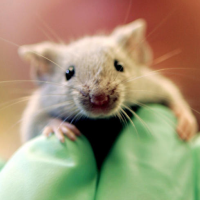Bias Found in Animal Medical Research for Human Brain Disorders
 (photo: Robert F. Bukaty, AP)
(photo: Robert F. Bukaty, AP)
Researchers testing new treatments for brain disorders often produce biased results when using animals, according to a disease expert at Stanford University.
Epidemiologist John Ioannidis, lead author of a new study published in PLOS Biology, said there was too much good news coming out of animal research addressing potential remedies for Parkinson’s, Alzheimer’s and stroke to believe it was all true.
Turns out it wasn’t true, or accurate.
Ioannidis and his colleagues found that only eight of 160 treatments they examined should have advanced to human trials. And only two of those studies appeared to lead to “convincing” data in the human trials.
For instance, dozens of stroke-related remedies appeared to hold promise based on the animal studies examined by Ioannidis’ team. But most of these same remedies failed to produce positive results after they were tested on humans.
“Something is obviously wrong,” Ioannidis told The Los Angeles Times. “Apparently what is happening is there are just too many studies being done that are being selectively reported, either having negative results suppressed or having the analysis presented in a way that the results would look positive even though they are really negative.”
Ioannidis did not go so far as to accuse researchers of committing fraud in their animal studies. Instead, he blamed institutional practices that favor reports with “positive” findings. An inclination to produce positive reports is driven by such influences as the need for study funding, the desired outcome of peer review boards and publishers that examine studies, and the prestige sought by universities and researchers who rely on positive findings.
Ioannidis claimed responsibility for being part of that system. “I am an investigator; at the same time I review applications, I review papers, I’m an editor of one peer-review journal and a member of the editorial board of another 30 peer-reviewed journals,” he told the Times. “So, if anything, I am to blame in all of my roles in which I try to find significant results.”
The negative effect of this institutionalized bias, according to the study, is that money is wasted and patients may be harmed during clinical trials.
The 160 treatment analyses reviewed by the researchers were based on 1,411 animal studies that utilized 4,000 animals. The eight treatments that the study deemed worthy for human trials involved testing on 500 animals.
There are about five million academic papers based on animal studies that are archived in the medical PubMed database.
-Danny Biederman, Noel Brinkerhoff
To Learn More:
Animal Studies Riddled with Bias, Report Finds (by Geoffrey Moah, Los Angeles Times)
Medical Research on Animals Often Biased, Scientists Warn (Agence France-Presse)
Evaluation of Excess Significance Bias in Animal Studies of Neurological Diseases (by Konstantinos K. Tsilidis, Orestis A. Panagiotou, Emily S. Sena, Eleni Aretouli, Evangelos Evangelou, David W. Howells, Rustam Al-Shahi Salman, Malcolm R. Macleod, John P. A. Ioannidis; PLOS Biology)
30% of Drugs that Work on Animals Don't Work on Humans (by Noel Brinkerhoff, AllGov)
Most Chimpanzee Research No Longer Necessary (by Noel Brinkerhoff, AllGov)
- Top Stories
- Unusual News
- Where is the Money Going?
- Controversies
- U.S. and the World
- Appointments and Resignations
- Latest News
- What If China Invaded the United States?
- Donald Trump Has a Mental Health Problem and It Has a Name
- Trump Goes on Renaming Frenzy
- Trump Deports JD Vance and His Wife
- Trump Offers to Return Alaska to Russia






Comments